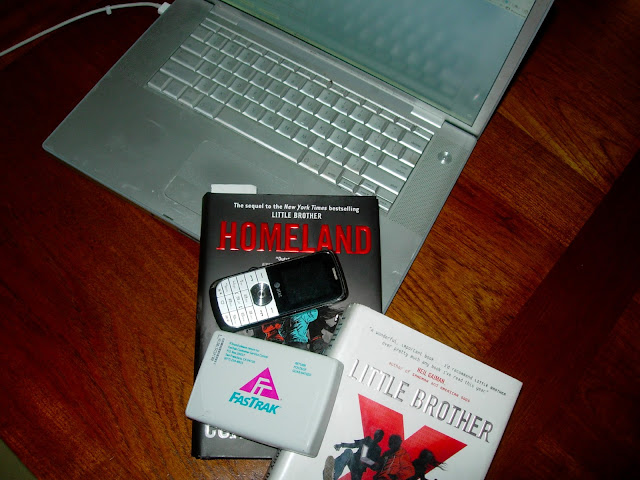 |
| Homeland by Cory Doctorow (TOR Books) ISBN: 978-0-7653-3369-8 |
Plot Summary
The sequel to Doctorow's Little Brother sees Marcus and Ange heading to Burning Man. There Marcus re-encounters Masha. She pulls Marcus into her confidence and tells him to release a series of files on a thumbdrive should anything happen to her. Of course, something happens before the sun even sets on Burning Man (but not before he and Ange play D&D with Wil Wheaton and the founders of EFF -- this encounter is the book at its most charming). When Marcus finally decides to leak the files, he finds that they contain information about Carrie Johnstone -- the woman who ordered his water-boarding in the first book -- and other members of Homeland Security. Marcus also hacks around with 3-D printers and quad-copters, teaches us how to make cold-brew coffee, deals with the emotional aftermath of being tortured and seeing his parents languish through unemployment, and joins the campaign of local politician Joseph Noss.Critical Evaluation
My colleague Margaret France wrote her dissertation about 18th century sequels (such as the followup to Robinson Crusoe). Her basic premise was that in place of the adventure and excitement of the initial novels, the sequels offered moralizing and didacticism. Doctorow offers something more than that, but does fall into similar traps as Defoe. The book feels like a call to action first and a work of serious fiction second. If the book doesn't replicate the same level of danger or terror as the first book, it's still timely and thought provoking. But whereas Little Brother could draw readers who didn't particularly have a passion for net neutrality, hacking, or making, Homeland is a sermon to the converted. Aaron Swartz's afterword succinctly sums the book. His recent death shines an even brighter light than Marcus' arc on the many issues the novel tackles.Reader’s Annotation
Marcus Yallow is recovering from some traumatic experiences -- defying the DHS, becoming a public figure, and being water-boarded -- at Burning Man. He is soon confronted by a ghost from his past. She shoves a thumbdrive into his hand and tells him to release the files if anything happens to her. Soon after, Marcus sees her being detained. Now Marcus is set to become a Julian Assange figure. Remembering all the pain notoriety brought him in the past, he struggles with how to live up to his word while still living his life (or staying alive at all).Information about the author
From the author's webpage:One sentence: Cory Doctorow (craphound.com) is a science fiction author, activist, journalist and blogger -- the co-editor of Boing Boing (boingboing.net) and the author of the bestselling Tor Teen/HarperCollins UK novel LITTLE BROTHER. His latest young adult novel is HOMELAND, his latest novel for adults is RAPTURE OF THE NERDS.
One paragraph: Cory Doctorow (craphound.com) is a science fiction author, activist, journalist and blogger -- the co-editor of Boing Boing (boingboing.net) and the author of young adult novels like HOMELAND, PIRATE CINEMA and LITTLE BROTHER and novels for adults like RAPTURE OF THE NERDS and MAKERS. He is the former European director of the Electronic Frontier Foundation and co-founded the UK Open Rights Group. Born in Toronto, Canada, he now lives in London. (Doctorow, 2013).
Genre
Speculative FictionCurriculum Ties
As a continuation of Little Brother, this book also speaks to similar strains in Orwell's 1984 -- a book often read in California high schools.Booktalking Ideas
1) The book is exciting. Reading one of the passages with tense action might be compelling.2) The book is current.
3) Everything feels real and much of the technology exists, so it's easy to put yourself in Marcus's shoes.
Reading Level/Interest Age
The protagonist is 17 years old, suggesting that older teens would find him relatable. The language also suggests that the reading level is likely 9th grade and up.Challenge Issues
Like Little Brother, Homeland depicts rebellion against Homeland Security as a noble cause while government agencies are painted as evil empires.I would openly greet any patron who presented a challenge to the work, giving them ample time to detail their complaint. I would listen attentively. To respond to these challenges I would have some reviews of the work on hand. I would be prepared to explain that as a public institution libraries "cannot limit access on the basis of age or other characteristics" (ALA, 1999). I would have copies of the library's collection policy on hand. I would be prepared to politely discuss that parents can control what their children are exposed to by coming to the library with them and examining books they check out. If the Teen Advisory Group had written reviews of the book I'd have them handy. While it may be of little comfort to certain parents, I would also be prepared to discuss my staunch support of intellectual freedom and abhorrence of censorship. As a last resort, I would be sure to keep copies or a reconsideration form on hand.

No comments:
Post a Comment